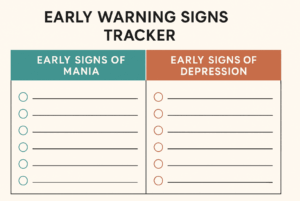Recognizing Early Warning Signs – The Power of Observation
🧠 “It felt like it happened overnight…”
For many families, the onset of a manic or depressive episode feels sudden. But in reality, there are often early clues—subtle changes in mood, sleep, speech, or energy that signal a shift is coming.
The earlier these signs are noticed, the easier it is to intervene, adjust treatment, and avoid hospitalization.
 🔍 What Are Early Warning Signs?
🔍 What Are Early Warning Signs?
They are mild, initial changes in thoughts, behaviors, or routines that appear before a full episode of mania or depression.
These signs are often repeated across episodes, making them unique and recognizable in each individual—if families learn to watch for them.
🔺 Early Signs of Mania
| Behavior Type | Examples |
|---|---|
| Sleep changes | Reduced need for sleep, not feeling tired, waking early |
| Speech patterns | Talking more, faster, interrupting others |
| Increased activity | Multiple new plans, impulsive travel or projects |
| Spending | Uncharacteristic generosity, online shopping sprees |
| Mood | Irritability, overconfidence, euphoric highs |
| Social | Becoming unusually sociable or argumentative |
🔻 Early Signs of Depression
| Behavior Type | Examples |
|---|---|
| Sleep changes | Oversleeping or insomnia |
| Fatigue | Low energy, frequent complaints of tiredness |
| Withdrawal | Avoiding calls, isolating from friends/family |
| Cognition | Trouble concentrating, indecision |
| Mood | Sadness, irritability, hopeless comments |
| Self-esteem | “I’m a burden” or “Nothing I do matters” |
📈 Case Snapshot: Anitha, 24
Anitha had a pattern of becoming overly cheerful and creative before each manic episode—writing poetry all night, skipping meals, and calling relatives to “announce” big life plans.
Her parents initially saw this as her “getting better” after a low phase. But once they tracked these patterns, they could alert her psychiatrist early, and tweak her meds before the episode escalated.
📋 Create an Early Warning Checklist
Work with your loved one (when stable) and note down:
-
“My signs of going high might be…”
-
“My signs of getting low might be…”
-
“Here’s what helps me when that starts…”
Keep a copy with both the patient and one trusted family member.
📲 Use Tools to Track Patterns
-
Mood chart apps like eMoods or Daylio
-
Simple diaries noting sleep, energy, irritability
-
Share patterns with the treating psychiatrist at each visit
🛑 What Not to Do
-
Don’t accuse (“You’re going manic again, aren’t you?”)
-
Don’t panic—episodes are manageable when caught early
-
Don’t wait until things explode—early action is easier than emergency care
💬 Takeaway
Families are the first line of defense—not through control, but through observation and communication.
When you recognize the storm on the horizon, you can anchor the boat before the winds rise.
👨⚕️ About the Author
Dr. Srinivas Rajkumar T, MBBS, MD (Psychiatry)
Consultant Psychiatrist | Apollo Clinics Velachery & Tambaram
Specialist in Mood Disorders, Family Psychoeducation & Crisis Prevention
🌐 www.srinivasaiims.com | 📞 85951 55808
📩 LinkedIn: Dr. Srinivas Rajkumar T